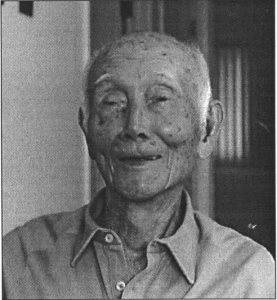Hayato Okino

Tsunamis Remembered: Oral Histories of Survivors and Observers in Hawai‘i
Life history interviews with individuals who witnessed and survived tsunamis-particularly the 1946 and 1960 disasters on the Big Island of Hawai'i. Thirty individuals-mostly residents of Hilo and Laupahoehoe-recall their experiences before; during, and after the 1946 and 1960 tsunamis which were arguably the most destructive natural disasters in modem Hawaiian history.
Hayato Okino was born August 18, 1912, in the Waiakea Town section of Hilo. He was the fourth of five children of Shimakichi Okino and Tsune Hamasaki Okino, who both immigrated to Hawai'i from Japan in 1901. Okino attended Wa.iakea Kai, Hilo Junior High, and Hilo High schools, graduating in 1932. His first job after graduation was an auto parts salesman for Ruddle Sales and Service in Hilo. Twenty-three years later, in 1955, he started his own auto parts business, Automotive Supply Center. The building was complete destroyed in the 1960 tsunami. Okino eventually relocated his business to the Hilo industrial area. An eyewitness to the 1923, 1946, and 1960 tsunamis, Okino is retired and currently lives in Hilo. His wife, Ritsuko Kadota Okino, whom he married in 1940, died in 1992. Okino raised three sons and has three grandchildren. The interview was conducted in Okino's Hilo home.
Scope and Content Note
A Waiakea-born man talks about the housing, fishing-related occupations, fish markets, and the layout and history of neighboring Shinmachi. Eleven years old in 1923, he describes the receding waters of the tidal wave. He also remembers the 1960 tidal wave, which destroyed his Hilo auto parts shop.
Program Note:
This interview is part of the Center for Oral History's project Tsunamis Remembered: Oral Histories of Survivors and Observers in Hawai‘i. Interviews from this project are available in the Center's ScholarSpace open access repository.
The Center for Oral History (COH), in the Department of Ethnic Studies at the University of Hawaiʻi at Mānoa, collects, documents, preserves and highlights the recollections of Native Hawaiians and the multi-ethnic people of Hawaiʻi. It produces oral histories and interpretive historical materials about lifeways, key historic events, social movements and Hawaiʻi’s role in the globalizing world, for the widest possible use.
Please Note: The oral histories in this collection are protected by copyright and have been created for educational, research and personal use as described by the Fair Use Doctrine in the U.S. Copyright law. Please reach out Voices@noaa.gov to let us know how these interviews are being used in your research, project, exhibit, etc. The Voices staff can help provide other useful resources related to your inquiry.
The NOAA mission is to understand and predict changes in climate, weather, oceans, and coasts, to share that knowledge and information with others, and to conserve and manage coastal and marine ecosystems and resources. The Voices Oral History Archives offers public access to a wide range of accounts, including historical materials that are products of their particular times, and may contain offensive language or negative stereotypes.
Voices Oral History Archives does not verify the accuracy of materials submitted to us. The opinions expressed in the interviews are those of the interviewee only. The interviews here have been made available to the public only after the interviewer has confirmed that they have obtained consent.
